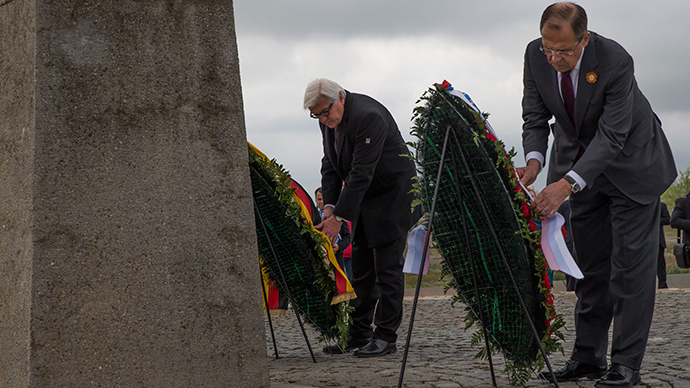Russia is ready to restore partnership with NATO – Lavrov

Russian Foreign Minister Sergey Lavrov said that Moscow is ready to renew its strategic partnership with NATO and has been receiving appropriate signals from the Alliance.
Lavrov told a media conference on Thursday that Russia will welcome a revived partnership:“I want to say with all honesty: we are receiving signals from our NATO partners that it wouldn't hurt to renew cooperation between our military departments. If there are any specific proposals to that end, we will certainly react in a constructive way,”he assured.
Lavrov was speaking to the media with his German counterpart Frank-Walter Steinmeier after the two had paid their respects to the memorial mass graves of Russian and German soldiers in Russia’s Volgograd. Formerly known as Stalingrad, the city was the scene of the bloodiest battle in World War II and possibly in the history of warfare.

While taking part in commemoration ceremonies, Steinmeier apologized for Nazi Germany’s actions: “I'm bowing to these sacrifices – and doing so mournfully. I bring my apologies on behalf of Germany for all the immeasurable sufferings that the Germans brought here.”
С.Лавров и Ф.-В.Штайнмайер возлагают венки в Зале Воинской славы на Мамаевом Кургане #Сталинградpic.twitter.com/iaBlRiBajh
— МИД России (@MID_RF) May 7, 2015
Sergey Lavrov told the media he had earlier received information from Brussles that direct phone lines had been restored between NATO and Russia. The German Foreign Minister stressed the lines' necessity: “In the current conflict situation, and the conflict is there and it cannot be denied, such contact is necessary, because some steps, some actions are often misinterpreted.”
“During the whole time that the crisis in Ukraine has been taking place, we've had increased military exercise activity on both sides,” Steinmeier said. “It is important that there is a hotline for both sides to receive information about it.”
READ MORE: Halting Hitler's push: Bloodiest WWII battle in RT's 3D reconstruction
According to Germany’s top diplomat, he had worked to establish such a hotline: “I have made personal effort to that end during NATO foreign ministers’ meeting last year. There were, of course, voices against it, who said it would be a ‘concession.’ I think that is a wrong position... I am very glad we are now restoring that exchange of military data.”
Asked about the Ukrainian conflict and the efforts to stabilize the situation, Sergey Lavrov said progress, albeit slowly, is being made: “It is difficult, but we are managing to move forward, maybe one millimeter at a time. This is confirmed by yesterday's meeting in Minsk, where the need was finally acknowledged for Kiev, Donetsk and Lugansk to speak to each other directly.”
Lavrov again stressed the need for all sides to adhere to the Minsk agreements struck between the leaders of Russia, Germany, France and Ukraine in February. He said Kiev was not too eager to do it, though: "Looking at the Minsk agreements and what they say the Ukrainian authorities have to do, it doesn’t take much effort to see that the Ukrainian government, unfortunately, is stalling a lot of processes.” This includes an amnesty for prisoners of war and the lifting of an “inhumane” economic blockade from eastern Ukraine, Lavrov said.
The Russian foreign minister said there was little doubt of the Western parties’ commitment to the agreements: “The fact that Kiev is very passive in adhering to the Minsk deal, is widely acknowledged. But that doesn't stop our Western partners from Europe and the US from visiting Kiev. And no-one will ever suppose they come to Kiev to encourage non-adherence to the Minsk deal.”












